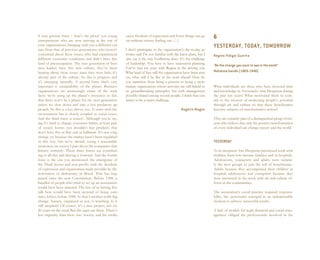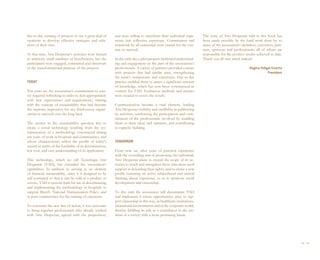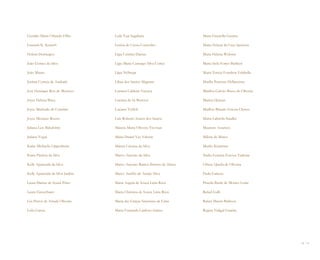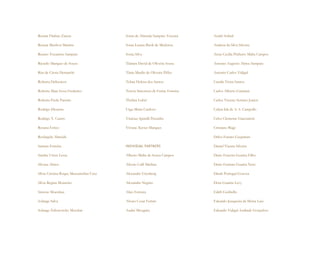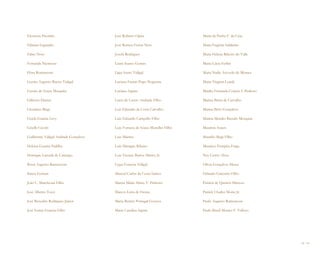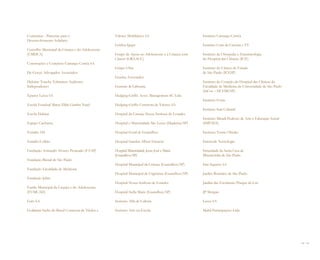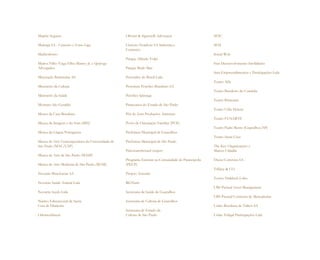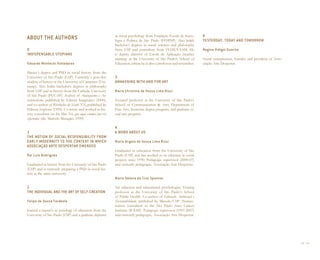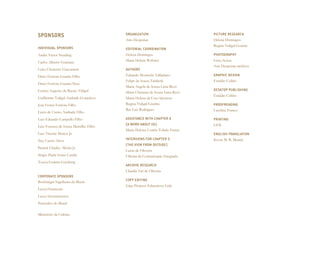This document provides an introduction to Associação Arte Despertar, which celebrates its first decade of operation. It discusses the organization's mission to awaken individuals' creative potential and treat others with consideration. Key philosophers like Michel Foucault and concepts like "aesthetics of existence" are referenced to explain how life can be viewed as a work of art through responsibility and creativity. The organization aims to produce moments of catharsis through art and support young people in the communities where its programs are located.
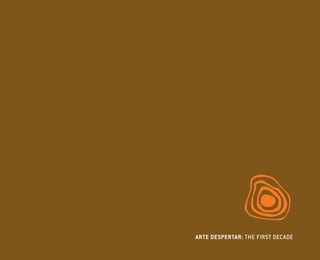

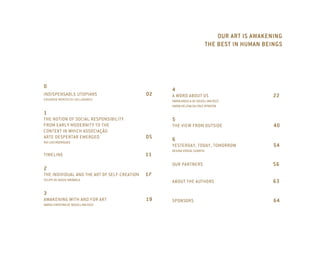
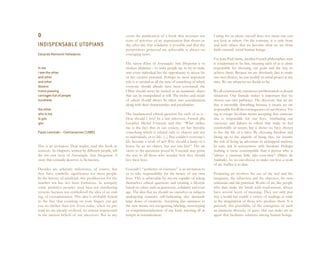
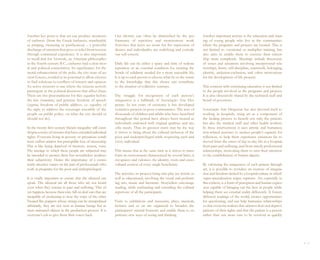
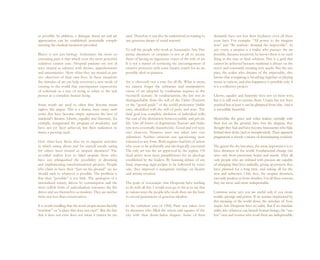
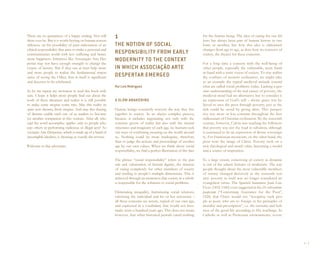
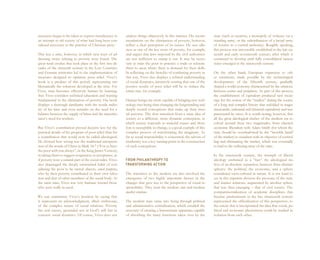
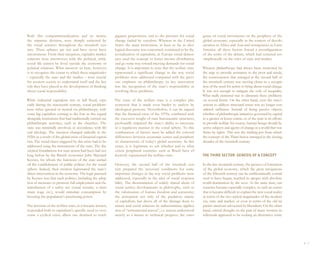
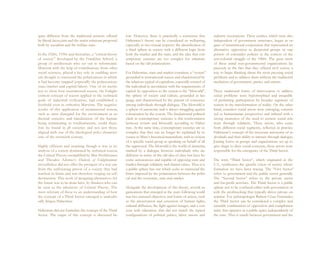
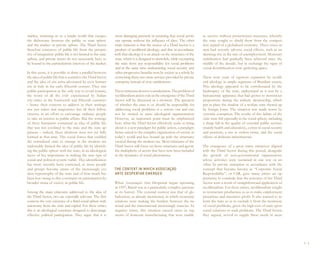
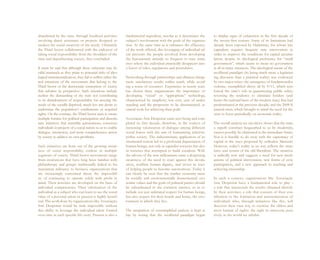
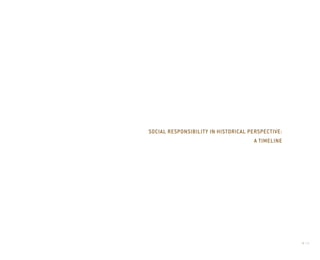
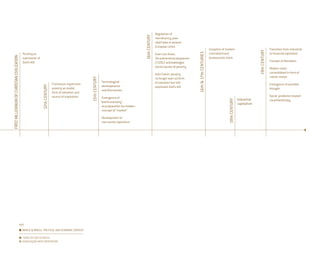
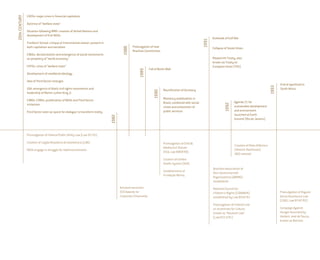
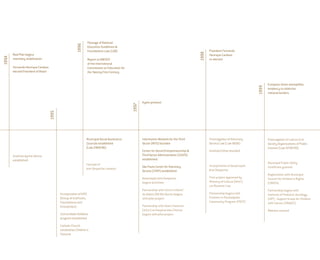
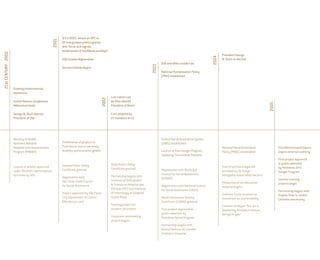
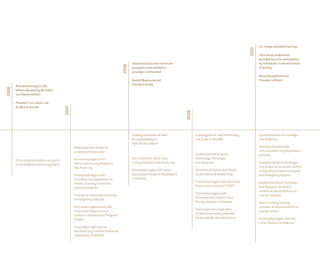
![process of specialization and division of labor, we can unable to adjust to the requirements of civilization
2 say that both activities nevertheless involve unique ways and the kind of abstract thought constantly demanded
THE INDIVIDUAL AND THE of seeing and forms of expression that dispense neither by today’s lifestyle so full of symbolic operations.
with beauty, on one hand, nor effort, on the other.
ART OF SELF-CREATION Communication became increasingly necessary as the
Felipe de Souza Tarábola In his seminal work Sociology as an Art Form, first pub- opportunity increased to “speak other languages”, to
lished in 1976, American sociologist Robert A. Nisbet be different from other people in one’s own group.
What strikes me is the fact that in our society, says imagination is the element responsible for this From a certain point in human history on, more op-
art has become something which is related only to closeness of the links between science and art, spheres portunities began to crop up for people to diverge
objects and not to individuals, or to life. That art is of human life that are equally motivated by the desire from the group to which they belonged by construct-
something which is specialized or which is done by to understand, and to interpret and communicate this ing personal values and worldviews that differed from
experts who are artists. But couldn’t everyone’s life understanding to others. It is always assumed that sci- the group’s. Reflecting on this question of the coexis-
become a work of art? Why should a lamp or a house be ence should be neutral, but many now believe neutrality tence between different lifestyles among members of
an art object, but not our life? is impossible to achieve in practice because scientists the same collectivity is important to sociology, which
are also subjectively guided, at the very least, by the emerged as a science that set out to problematize
Michel Foucault 1 conditions prevailing in their own times and influenced the feeling that the constitutive events of the period
by the problems of their societies, in some cases even known as modernity had caused a crisis. At that time,
taking the values of the group to which they belong the aftermath of revolutions (the French Revolution
At first glance is anything more different from our idea of as a compass. Similarly, art forms such as novels, po- and the industrial revolution, for example) and loss
what a scientist is than our image of an artist? Comparing ems, plays, music, paintings and so on are ways of of influence on the part of religious ethics over other
the scientific method, based on logical reasoning and rig- casting light on reality, regardless of whatever language areas of collective life, which had begun functioning
or in pursuit of truth, with an activity driven by creativity and medium they use. For example, can there be any autonomously, meant that family origins, gender and
and the expression of feelings may seem somewhat bi- doubt that Machado de Assis is an inexhaustible source social status were no longer the key to a person’s iden-
zarre. Indeed, it is – although once upon a time it wasn’t: of information and points of view on social reality in tity. The increased autonomy and mobility achieved by
after all, what about Leonardo da Vinci, who engaged as nineteenth-century Brazil? individuals in the modern era enable them to “play”
intensely with art as with science? What about the impor- with collectively inherited influences.
tance for his creations of his methodical research into the Thus science and art are both authorial forms of
dimensions and laws of proportion of the human body? communication and expression, both of which are The importance of specialized education and training
necessary to mental and social subsistence. As Aristo- so that the skills needed by industrialized production
Science is often taught today using ready-made for- tle pointed out, “man is a political animal”, meaning could be acquired, alongside an increase in exchanges
mulas, and even more frequently artistic creation is that human beings cannot develop their abilities to the between different groups made possible by urban life,
superficially interpreted as an activity freely inspired by full unless they live collectively, which is possible only enabled other constitutive models to flourish and
the artist’s emotions. thanks to another human characteristic: language and broke the monopoly held by the standard for human
logical reasoning. There is no shortage of examples in beings prevailing in traditional communities. The no-
Looking beyond these stereotypes constructed since the literature, psychology and linguistics of people said to tion of an individual as a member of the species so
nineteenth century and intensified by the continuous have been found in complete isolation from society, endowed with unique properties as to be irreplaceable
without human contact, sometimes supposedly reared emerged only with modernity, when the dominance
1
Michel Foucault. (1991) [1984]. ‘On the genealogy of ethics: An or cared for by animals, or simply surviving on their of the collectivity over the person was shaken to its
overview of work in progress’. In Paul Rabinow (ed.), The Foucault own. These people had no chance to learn to speak roots and the “mold” from which everyone was (con)
Reader. New York, Pantheon Books: p. 350. and in attempting to adapt to community life proved formed was shattered.](https://image.slidesharecdn.com/artedespertaringlesmiolobaixa-110608154654-phpapp01/85/Arte-Despertar-the-first-decade-19-320.jpg)
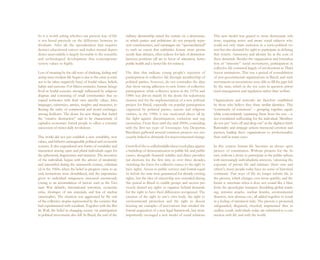
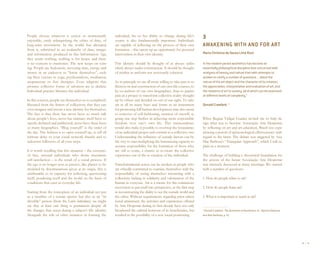
![4. How can the content of art education and learning There is no predominant procedure or hierarchy in
be organized? these combinations or their content. On the con-
trary, the key is the pertinence of each choice, always
5. Will the work situations in art to be offered by Associa- emphasizing the coherence between objectives and
ção Arte Despertar constitute art education and learning? methods. In light of this, organicity and flexibility are
also important in such an approach to art education.
6. What is the specific focus for the organization’s activi-
ties? Will it set out to influence the reality of art education? The methodology can perhaps best be grasped in pic-
torial form, as shown in the figures.
The theoretical and methodological components of
the Triangular Approach to art education helped us In Figure 1, the construction of knowledge in art takes
develop answers to these questions, thanks to the topi- place at the intersection of Making, Reading and Con-
cality and pertinence of the research undertaken by Ana textualizing. It derives from the dynamic interaction of Figure 1. Construction of Knowledge in Art
Mae Barbosa, who was then the director of Museum subjects who act on reality, which is in turn made up of
of Contemporary Art at the University of São Paulo. biological reality and sociocultural reality. In Ana Mae
Her research was largely inspired by three art education Barbosa’s own words: “The crossing of aesthetic stan-
movements: Mexico’s Open Air Schools (Escuelas al dards with values-based critical discernment should be
Aire Libre), Critical Studies in the U.K., and Discipline the dialectical principle that presides over the content
Based Art Education in the U.S. of the school art education curriculum, through the
magic of making, the reading of this making and of
According to Ana Mae Barbosa, the construction of the making of popular and academically trained artists,
knowledge in art takes place at the intersection of experi- and the contextualizing of these artists in their time
ence with codification and information. In this context and space” (BARBOSA, 1994, p.34).
research and comprehension of the questions involving
the relations between art and public become an object Figure 2 represents in colors the three major forms
of knowledge. Thus an art education program should of human thought that interact in bio/socio/cul-
consider three basic activities to be executed in contact tural reality: ART (red), PHILOSOPHY (green) and
with art: “making art”, “reading artworks”, and “contex- SCIENCE (blue). The other colors produced by their
tualizing”, by which she means placing information and intersections represent the multiplicity of areas mobi-
knowledge about art and art history “in dialogue” with lized in a single act of knowledge.
other areas of human knowledge. This gives the follow-
ing possible combinations or “sequences”: The points of light correspond to the moments at
which Making Art, Reading Artworks and Contextu-
SEQUENCE 1 READ MAKE CONTEXTUALIZE
alizing Art/Knowledge about Art intersect as a result
of the choices made by the subjects of artistic pro-
SEQUENCE 2 MAKE READ CONTEXTUALIZE
cesses. In the words of Deleuze and Guattari: “What Figure 2. Visual schema of dynamics of bio/socio/
SEQUENCE 3 CONTEXTUALIZE MAKE READ
defines thought in its three great forms – art, science cultural reality
SEQUENCE 4 READ CONTEXTUALIZE MAKE
and philosophy – is always confronting chaos [...]
SEQUENCE 5 CONTEXTUALIZE READ MAKE
But philosophy wants to save the infinite by giving
SEQUENCE 6 MAKE CONTEXTUALIZE READ it consistency [...] Science, on the other hand, relin-](https://image.slidesharecdn.com/artedespertaringlesmiolobaixa-110608154654-phpapp01/85/Arte-Despertar-the-first-decade-22-320.jpg)
![quishes the infinite in order to gain reference. [...] Art These are the theoretical foundations that gave sustain- ART READ
wants to create the finite that restores the infinite [...]” ability to the activities of Associação Arte Despertar.
(Deleuze e Guattari, 1992). PHILOSOPHY
In the ensuing years, action and reflection on practice
Figure 3 attributes colors to the three main forms of gave its activities methodological consistency, from SCIENCE
thought. Figure 4 represents in shapes the actions of which derives the quality that can be seen from this
which the construction of knowledge in art consists. publication commemorating its ten years of existence. Figure 3 Figure 4
Figure 5 shows the two-way connections between The Triangular Approach has become the paradigm
actions (Making, Reading, Contextualizing) and of contemporary art education, permitting a close
knowledge areas (Art, Science, Philosophy). interrelation between subjects and art while also actu-
alizing its dynamics and sociocultural importance.
Figure 6 shows the intersections between actions and
knowledge areas in a given bio/socio/cultural reality. Therefore, in drawing up a balance sheet of the activi-
ties developed by Associação Arte Despertar, we can
The visual approximations of the shapes shown in pose a number of questions that arise from its theo-
Figure 7 enable us to see that any given knowledge retical and methodological choices:
area is made up partly of collaboration by and inputs Figure 5 Figure 6
from others, since the division of knowledge into • What understanding has Associação Arte Desper-
distinct areas and disciplines, characteristic of the tar developed with regard to this approach to art
social construction of knowledge in the west, no lon- education, and how has it been operationalized in the
ger corresponds to the understanding of reality and various activities performed since its inception?
knowledge in the early 21st century. Figure 8 illustrates
the dynamics of actions and knowledge as they move • Is this understanding present in all artistic languages?
apart, move together and merge. When they merge in a
certain way, they become art and/or knowledge of art, • Have there been changes over time? If so, what has
feeding back into the sociocultural dynamics of reality: changed?
“Pertinent knowledge should confront complex- • Have there been difficulties? Successes? What kind?
ity. Complexus means woven together, plaited. What solutions have been found? Figure 7
Complexity exists where different elements are
inseparable components of a whole (such as the • What impact has this conception of the construction
economic, political, sociological, psychological, of knowledge in art had on the constitutive process of
affective, mythological) and where there is an inter- Associação Arte Despertar?
dependent, interactive and inter-retroactive tissue
between the object of knowledge and its context,
between the parts and the whole, between the
whole and its parts, and between the parts them-
selves. Thus complexity is the union between unity
and multiplicity” (MORIN, 2000, p.38). Figure 8
20 I 21](https://image.slidesharecdn.com/artedespertaringlesmiolobaixa-110608154654-phpapp01/85/Arte-Despertar-the-first-decade-23-320.jpg)
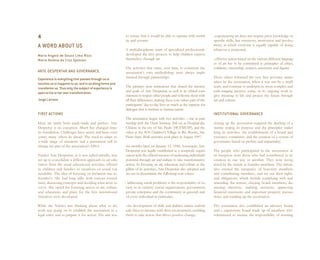
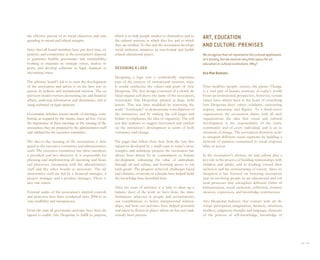
![others, and knowledge of the environment. The ART IS TRANSFORMATION human development and increases cognitive potential
association seeks to combine the perceptible and in terms of conceiving and seeing the world in differ-
the intelligible through interaction with the par- Art can raise man up from a fragmented state into ent ways that are closely linked to the interests of those
ticipants in its projects. Through respect for the that of a whole being. Art enables man to comprehend who learn to attribute meanings. This way of proposing
people with whom they interact, and particularly reality, and not only helps him to bear it but increases experimentation with art can break through barriers of
for what makes each one unique, its art educators his determination to make it more human and more exclusion, since art education is grounded not in talent or
gradually discover their perceptual, mnemonic and worthy of mankind. Art is itself a social reality. Society a personal gift but in each person’s ability to experiment.
cognitive potential, enabling them to experience needs the artist, that supreme magician, and it has
the encounter with art as a fount of knowledge and a right to demand of him that he should be conscious The beneficiaries of Arte Despertar’s activities are
self-fulfillment. of his social function. Even the most subjective of encouraged to take risks, to stick their necks out, to
artists works on behalf of society. By the sheer fact of draw, paint, represent, touch, write and read. These
In the specific context in which the activities oc- describing feelings, relationships, and conditions that activities are not regarded as competitive, but as experi-
cur, this approach, alongside the reflection and have not been described before, [he is] reaching out ences, personal or collective. This principle means that
interaction it motivates, opens up a multiplicity of into a new collective full of differences and tension, all those involved see themselves as participants in and
viewpoints, ways to express creativity and foster in- where the individual voice is not lost in a vast unison. creators of their own paths. Their discoveries are made
terpersonal exchange. possible by the art they experience, which is not incom-
Ernst Fischer prehensible, elitist or distant from reality.
Thus the association’s work in this field contributes
to significant advances in social responsibility, pro- Art is the foundation for all the activities of Arte Des- Thus conceived, art takes into consideration different
moting creation and dialogue and promoting richer pertar. Art plays an important role in people’s lives, ways of producing, comprehending and organizing
human relationships through art and culture. especially in an unequally structured society. Access to social life. Culture in turn is seen as in permanent trans-
art allows people to find creative solutions to everyday formation and expansion, and as a basis for action that
A key feature of its projects, and one that makes challenges, such as inclusion. fosters the construction of knowledge. In this sense
them unique, is that its team of art educators work there is no division between theory and practice, reason
in the communities and hospitals where art and cul- Nineteenth-century rationalism claimed that society and perception. The result is in an integrative approach
ture make a difference. Moreover, the interpersonal should place a high value on scientific and verbal lan- that values skills and enables those who create or ap-
relationships facilitated by its activities foster learn- guage. As a result, for much of the twentieth century preciate to deal with complexity.
ing by doing, discovering the talent of each person, the importance of visual literacy to an understanding
experimenting, and expressing sensibility through of other languages was ignored. However, at the start Art transcends immediatism, presenting itself as a
the languages of art. of the twenty-first century the image stands out as the way of constructing knowledge. It develops per-
characteristic language of the age, present in billboards, ception, imagination, memory, attention, intellect,
The concepts and choices behind the activities television and computers. Thus to cope with everyday judgment, thought and language, elements that make
of Arte Despertar are grounded in premises that life it is important to be familiar with different languag- up the process of cognition. Through these facul-
situate art as a creative activity which requires ex- es and interact with a wide variety of art works as a ties, according to Paulo Freire (1982), humanization
perimentation, appreciation and interpretation of mode of expression, a source of interpersonal experi- is configured as a finishing point, as the bearer of
the codes through which human beings seek to ence, and a form of access to contemporary culture. capabilities that develop awareness and enable the in-
communicate and attribute meanings to the world. dividual to act and think as an author.
The organizing principles described below were de- Based on this recognition of the necessity of art and its
veloped by its art educators to orient its practices transformational capacity, Arte Despertar’s activities This approach to the languages of art as tools for con-
along these lines. disseminate the idea that producing art contributes to struction, knowledge and expression is in tune with the](https://image.slidesharecdn.com/artedespertaringlesmiolobaixa-110608154654-phpapp01/85/Arte-Despertar-the-first-decade-26-320.jpg)
![latest findings in the field of art education. By reflect- The practices of Arte Despertar are inspired by the various ways. For this reason, Moacir Gadotti (1979,
ing on its own experience in the field, Arte Despertar work of four educators: Paulo Freire, Jean Piaget, Lev p. 107) characterizes Freire as a critical constructivist:
contributes to the consolidation of a new pedagogy and Vygotsky, and Elliot Eisner.
strengthens the conception of art as specific knowledge, You learn when you want to learn and you learn only
which it regards as a process of cognition grounded in Freire’s theory of popular education orients the prac- what is meaningful, say the constructivists. Paulo
perceiving as a way of knowing, as theorized by Ru- tices of Arte Despertar, which sets out to transform Freire was also one of the creators of constructivism,
dolf Arnheim (2002). Thus it enables subjects to reflect, reality by treating the individual as an active subject but of critical constructivism. Ever since his first ex-
understand and acquire tools that make their own and protagonist of the teaching-learning process. By periments in the Northeast of Brazil in the 1960s, he
transformation possible. developing joint activities in different public spaces, sought to ground teaching-learning in interactive en-
the association extends the opportunities for ex- vironments through the use of audiovisual resources.
Arte Despertar’s activities are driven by its vision of the perience and forms communities of culture that Later he reinforced the use of new technology, espe-
human being as a symbolic animal. We invent and cre- permanently recreate Freire’s legacy in workshops, cially video, television and the computer. But he did
ate symbols to interpret the world. We use our ability seminars, study groups and working groups. These not accept its uncritical use.
to symbolize as part of our reason, but also in language, teaching-learning processes enable socially vulner-
art, religion and myth, according to Ernst Cassirer able people to emancipate themselves. The high For Piaget (1974), the subject extracts knowledge
(1994). Without all this, human life would be reduced value placed on everyday experience and on popular from action. He advocates innovative and active
to the satisfaction of biological necessities and practical knowledge and traditions opens up a perspective for education that motivates learners to make discov-
interests, lacking projects of any kind. the recognition of individual creativity. eries and to see themselves as relevant partners in
the teaching-learning process.
Each individual combines perception, imagina- In The Importance of the Act of Reading (1982), Freire de-
tion and a cultural and historical repertoire to read scribes how reading can stimulate and contribute to Vygotsky’s emphasis on the social nature of all men-
the world and re-present it in a unique manner us- the study of lived daily life. In order for experience tal activity (1991) completes the social-interactionist
ing forms, colors, sounds, movements, rhythms and to become concrete as education, it is necessary for and constructivist approach adopted by Arte Des-
scenes. These and other elements of art constitute the there to be dialogue, exchange and interaction. Sub- pertar. While in general there are more divergences
languages used by Arte Despertar to humanize peo- jects who dialogue think together and recreate reality, than convergences between Piaget and Vygotsky,
ple’s environments, restore their self-esteem, educate as long as truth is the foundation for this joint activity. both understand knowledge as adaptation and in-
them, and include them in society. In Pedagogy of the Oppressed, however, Freire claims that dividual construction, and both see learning and
“while to say the true word – which is work, which is development as self-regulated. While Piaget is inter-
praxis – is to transform the world, saying that word is ested in the ways in which knowledge is constructed,
ART IS CITIZENSHIP not the privilege of a few, but the right of everyone” so that his theory focuses on the mental construc-
(2005, p. 90) [Continuum, NY/London, 2000, p. 88]. tion of the individual, Vygotsky highlights the ways
The movement from the world to the word and from the This perspective makes possible a dialectic between in which social and cultural factors influence the
word to the world is always present. In this movement action and reflection that is essential for an education learner’s intellectual development.
the spoken word flows from our reading of the world. that problematizes the real.
However, we can go further and say that reading the Piaget underscores the biological aspects of the
word is not merely preceded by reading the world, but In his formulation of the premises for the pedagogy educational process. The stages in which mental
by a certain form of writing it, or re-writing it, that is, of of freedom, Freire argues that technology is an instru- development unfolds are supported by biology and
transforming it by means of our conscious practice. ment for students to act on the object of study and identical for all individuals. Similarly, knowledge is ac-
acquire a new worldview. Content is not passively as- quired through exchanges and interactions with the
Paulo Freire similated, he says, but worked on and reworked in object. The individual reconstructs the object to ap-
24 I 25](https://image.slidesharecdn.com/artedespertaringlesmiolobaixa-110608154654-phpapp01/85/Arte-Despertar-the-first-decade-27-320.jpg)
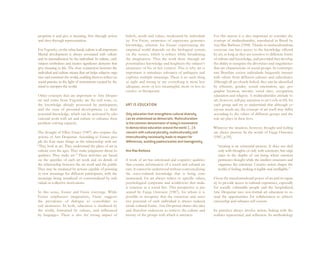
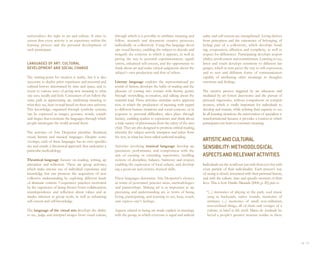
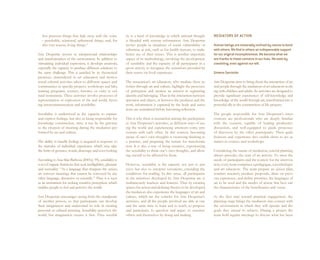
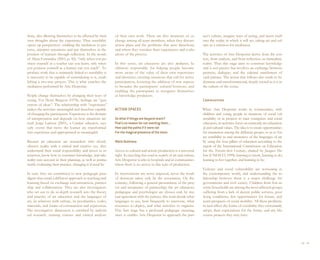
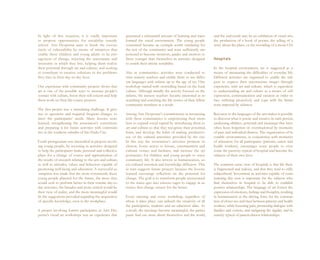
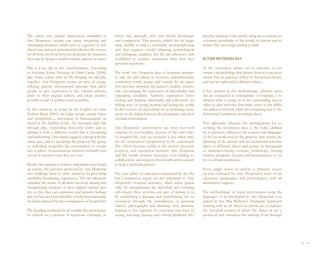
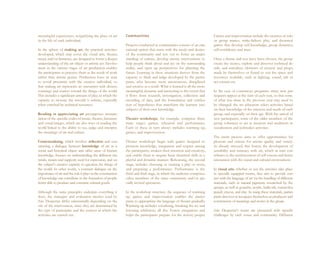
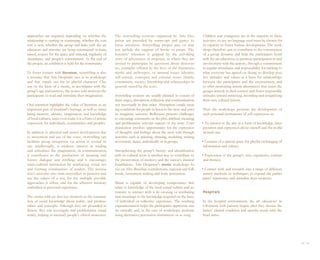
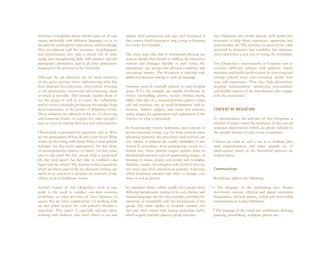
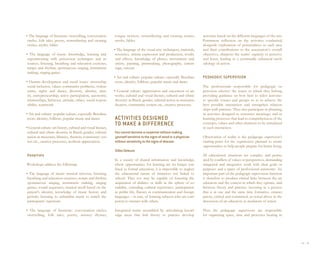
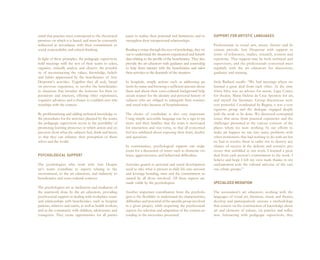
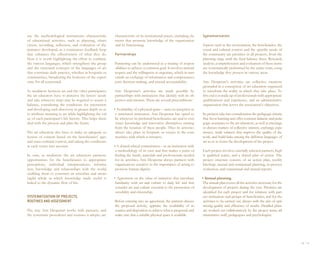
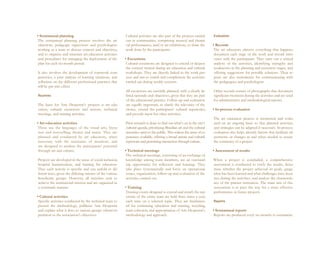
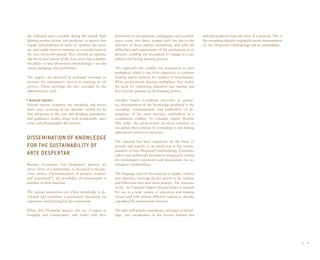

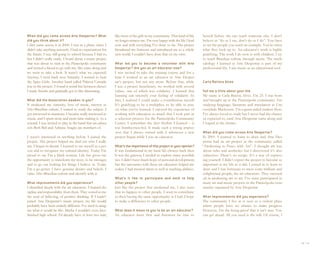
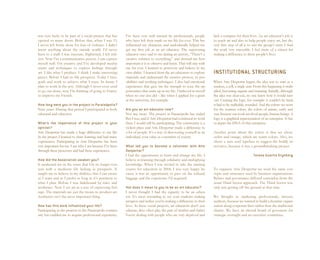
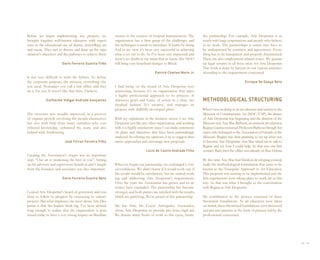
![The work they do is very serious, very carefully Another impressive dimension is the work they do Shortly after that we went to Paraisópolis. This was
thought through, very important. It involves a with art educators, inviting them to develop and lead a partnership agreement with the Einstein in the
combination of several elements. Arte Despertar projects. These professionals are trained on the job, Paraisópolis Community Program [run by Hospital
has a mission, which is to help individuals develop given access to courses, lectures, project planning Israelita Albert Einstein]. It started very small, with
through artistic activities. Over time, in all these meetings and so on. Initially this helped construct the children grouped by age, and although they were
years of witnessing the activities, reading reports and the profile of Arte Despertar as well as the profiles very poor they had a family structure for support.
watching performances of plays and music, I’ve seen of the professionals concerned. I’ve seen a lot of
work done to a high level of quality and individuals people who have matured through their participa- Lígia Cortez
who have had real opportunities to develop person- tion in Arte Despertar and are now outstanding
ally and artistically. artists and art educators in a broader social sphere.
So there has been a process of leadership building. I believe art is really a way to awaken people, a trans-
Maria Christina de Souza Lima Rizzi formation that leads individuals to change their way of
Maria Christina de Souza Lima Rizzi seeing, their worldview. Art works with people’s sensi-
bilities and perceptions, enabling them to develop new
One thing I can say, first, is that it was a marvelous expe- ways of learning that can cast new light on their lives and
rience to be invited to work with Arte Despertar. I don’t One of the first challenges was team building. We open up new perspectives. Regina has always worked
remember very clearly how it happened, but I recall my began very small and then expanded. (...) My own with art as a means to learn from your own experience,
first contact with Regina, which was through mutual involvement was always with the educators, both based on each participant’s personal development. You
friends or something of that kind. I was very excited and those who worked in hospitals and those engaged should never take too big a step or go too fast. It’s one
impressed by the soundness of the methodology and the in the communities, working with stories in the oral small step after another in a continuous construction
intense dedication, which was very heartwarming. tradition. We always tried to activate imagination and that involves participation by everyone. (...)
imagery linked to cultural diversity, ethnic diversity,
So the idea was for us to do something at the hospital. seasonal festivities, a universe in dialogue with the The storytelling universe can lead an individual to their
This was the biggest challenge in the world – what culture of each person we met. The work involved a own story. Regina Machado, a great storyteller, likes
were we to do there? Also, it was going to work at dialogue among various cultures. I led some very in- to say that there is a vertical axis, which is the story,
a place called Aldeia SOS (SOS Children’s Village), tense training workshops where we studied the stories, and a horizontal axis, which is your life, and the two
which was just getting under way. Theater was one of looked at the art and listened to the music of a par- axes intersect. Through this intersection you can re-
the possibilities. ticular ethnic group. The plan was to weave a broad tell your own story through the stories you tell. What
tapestry, with various ways of seeing the same culture. matters most to the storyteller is being at the service
Lígia Cortez of the story and the listener. This encounter has the
Stela Barbieri power to transform people through art. The artwork
is the point of contact. It’s through these interactions
They’ve always worked with professionals, educa- that transformations can happen. A hospital patient,
tors, people who have done teacher training. Arte The biggest challenge was approaching these children. for example, can see the world from a new angle. The
Despertar introduced play, games, as a way to learn The first contact was as a group, although we did talk light at the end of the tunnel is the artwork.
and acquire culture for families as well as children. to each one individually. Then there came a moment
Everything from music to the arts. (...) Wow! Visual when we started working with their mothers so they I think storytellers need to know themselves very well
arts, that was a fabulous idea! could understand and see what was going on, and and also need to be very familiar with the universe of
grasp the value of it. It was a profound learning pro- stories, the cultural universe, everything around the
Célia Yukiko Osato cess and a very tough reality to come to terms with. story, the context, the meanings, smells, tastes, the](https://image.slidesharecdn.com/artedespertaringlesmiolobaixa-110608154654-phpapp01/85/Arte-Despertar-the-first-decade-46-320.jpg)
![weather, and so on. Stories are impregnated with all they’re paralyzed or disabled in one way or another, Despertar and other NGOs to make sure children’s
these things. All these layers of reading made pos- even temporarily, or debilitated, obliges these art right to care is respected. In the case of Arte Desper-
sible by a culture are concentrated in them. Stories educators to find absolutely unique procedures for tar, art educators have a very serious task to perform.
synthesize human complexity and spiritual yearning. addressing each situation. Sometimes the patient is They’re extremely objective about it. They actually
there and then just not there the week after. You do teach the children we have here. So humanization
Stela Barbieri never know who you will be working with when you helps time pass while they’re in hospital, attenuates
arrive or how ready people are to work with you at the pain and the trauma. That’s fundamental.
that moment. There are people who are undergo-
We all have art inside us. It’s just a matter of letting it ing chemotherapy or hemodialysis or in the ICU or Antonio Sérgio Petrilli
well up to the surface. What’s more, I believe art is vi- in any number of different situations. Because of all
tal. It isn’t a choice. It’s totally different when you work that, Arte Despertar’s team had to formulate princi-
with something else, anything that isn’t art, that’s voca- ples and strategies for their work, not just in terms of Santa Casa de Misericórdia de São Paulo, a charity
tional or leads to a job later on. When you work with how to proceed with specific people but also how to hospital in the city of São Paulo, also has a cultural
art you’re forming the individual. It can be beneficial. organize the material used in these activities – what arm. This places a high value on culture through a
It can be therapeutic, positive, if other people listen. to take along, how to package it all, how to prepare. number of projects involving museums, for exam-
It’s a form of metaphorical communication. (...) That’s All that was created by the Arte Despertar process. ple, among other things. In fact, we have a museum
very important so that we can get a lot of things off our inside the hospital. So the institution itself gives pri-
chest — monsters, fears, difficulties — through art. Maria Christina de Souza Lima Rizzi ority to culture and art. This chimes perfectly with
And it’s crucial that others see your work. You need to the goals of Arte Despertar, whose approach to
have performances, exhibitions, communication. thinking about art and the value of art is similar to
The key thing is that the vast majority of the children our own. Bringing art in all its forms, even the sim-
Lígia Cortez treated here at the hospital have never been exposed plest, to our patients means offering them a whole
to this type of stimulus, and it’s easy to see how in- new experience that doesn’t just revolve around the
terested they are by this introduction to culture. (...) corporeal. This is beneficial for everyone, of course,
We would go to hospitals and communities, and I Healing is not enough. We want to heal and also to for the patients and the institution.
would provide assistance based on the educators’ provide quality of life and social inclusion, meaning
practice. It was very interesting work. The educators they have a chance to find a job after they leave here, Wilze Laura Bruscato
were incessantly challenged to invest in the relation- or to study. If possible, they should leave here with
ship with each and every person present, to find a new skills and abilities, so they can continue their
way in, despite the pain or unhappiness those people lives positively, so this disease [cancer] doesn’t stop I think its role is fundamental. Let me take an area I
felt, so as to gain access to their healthy, hopeful side, them from living their lives. (...) To me the key to feel comfortable talking about, which is humanization,
creating an internal world of images and stories in humanization is that you treat others as you would especially in hospitals. This is incredibly rich in my view,
which the narrative sequence could suspend reality like to be treated. How would I want a child of mine for two reasons. The first is medical. As you increase
for a moment and let other emotions in. to be treated while in hospital? So you have to ask the levels of specialization, subspecialties, technology
what’s most important for this to happen. I think etc., you start finding it hard to know whether it’s the
Stela Barbieri we’ve made a lot of progress. Once upon a time technology that produces the diagnosis, the treatment,
people accepted whatever they were given. Chil- and governs relationships between patients and carers.
dren weren’t taken seriously anyway. Our experience Patients often focus on the machine. The human mean-
What I see is that this challenge of working with shows the opposite. Our watchword is solidarity. We ing of the relationship is lost. These changes that have
a person who is in a vulnerable situation because try to partner with their families. We work with Arte been made so that new technology can help the pa-
44 I 45](https://image.slidesharecdn.com/artedespertaringlesmiolobaixa-110608154654-phpapp01/85/Arte-Despertar-the-first-decade-47-320.jpg)
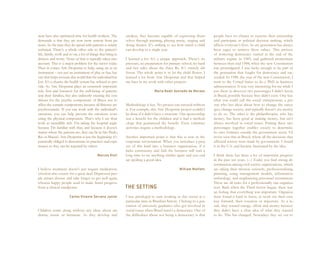
![define a mission, a role, a program; they work on that they are non-governmental. My baptism and I think we still have some unresolved issues. I’d say
success indicators and so on. All this is part of what growth in the Third Sector happened as I’ve told one unresolved issue is how the government should
these organizations do and didn’t exist ten years ago. you. That includes my thirty years of experience. treat civil society organizations. Brazil still doesn’t
Another point I want to stress is that these orga- have a legal framework, and the government needs
nizations have started to see that the Third Sector Marcos Kisil to provide more incentives for Third Sector initia-
needs partnerships. I believe there was a lot of pent- tives. It seems to me that the government continues
up energy when the Third Sector began – everyone to display a certain fear of directly supporting what
wanted to go out and do everything. The ones that There’s much more professionalism today, in my society can do for itself. This requires more work.
succeeded had a strong brand. It was unusual for opinion. As a result, structures similar to those of Society needs to lobby for changes to public poli-
them to build partnerships. Organizations wanted firms in the Second Sector have begun to emerge. cy on the issue of citizenship. A second concern is
their projects to be exclusively their own. That was governance and the leadership turnover these orga-
only natural. What I’m saying is that at the time it The Third Sector has started to understand this as an nizations require. Many of these organizations were
was very important for individuals to establish a clear efficiency model and hence the evolution we’ve seen set up by people who are still running them. As a
position, to be unique. Now, however, people are in the last ten years. In addition, they invest their funds result, there isn’t a second generation ready to take
more aware of the need for partnerships right from a more effectively thanks to this professionalization. over. I’m talking generally here, pointing out that the
program’s inception. The last point is that they used Third Sector isn’t good at producing new leaders. A
to call themselves NGOs because they didn’t want Heloisa Guarita Padilha third concern relates to the use of evaluation, which
to work with government, but now they’re aware of should be more frequent. We’re used to evaluating
the role played by government, which is to dissemi- products in Brazil, but not processes, the processes
nate their work to the general public. So there’s no The Third Sector fills the gaps left by the public sector. used to make something or do something, and we
longer a clear distinction between what’s non-gov- Of course there are distortions, but mostly a lot of hard also don’t evaluate the impact of processes on the
ernmental and governmental. Now they know they work gets done. It’s all very serious. We’re in touch people who benefit. (...) So these are the three main
have to work together for any participatory citizen- with other NGOs and others that do the same as us are points that still require more work.
ship process to succeed. clearly very efficient. This isn’t just happening in Brazil,
evidently, but here there’s such acute inequality that it’s Marcos Kisil
Here in Brazil I’ve been in the social sector since very fertile ground. People come to see us when they’re
the beginnings of redemocratization. I’ve been starting an NGO. So we’re a benchmark.
involved with several movements since the Constit- Here at this institution, we have certainly changed.
uent Assembly, and with the emergence of various José Ferraz Ferreira Filho In my view many healthcare institutions introduce
movements, such as Instituto Ayrton Senna, Abrinq, humanization practices merely to comply with min-
Ethos, Centro de Voluntariado de São Paulo, and isterial orders. That’s not the case here. We’ve had
academic groups that do research on the Third There’s been a great deal of growth in the past few this from the cradle. It’s no accident that we’re
Sector. I’ve been privileged to be part of all these years, but without organization. The number of social called “Santa Casa de Misericórdia” [“Holy House
movements and I’m one of those people who feel projects has increased, as well as the number of vol- of Mercy”]. We’ve always practiced humanized care.
deeply grateful and convinced that the Third Sector unteers. I’ve been working in the field for 23 years and I believe Associação Arte Despertar, which is now
can be a tremendous benefit to society. Personally I when I analyze what’s happening I can see this is a ten years old, thought of this first because the Min-
don’t like the term Third Sector. I prefer civil society highly positive trend: we used to be considered people istry of Health started thinking about it at around
organizations, an expression with a very important who had nothing better to do, especially us women. the same time.
positive connotation, relating to what they give to
society, rather than a negative one relating to the fact Telma Sobolh Wilze Laura Bruscato
46 I 47](https://image.slidesharecdn.com/artedespertaringlesmiolobaixa-110608154654-phpapp01/85/Arte-Despertar-the-first-decade-49-320.jpg)
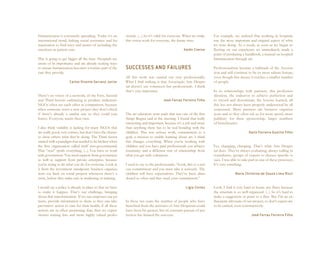
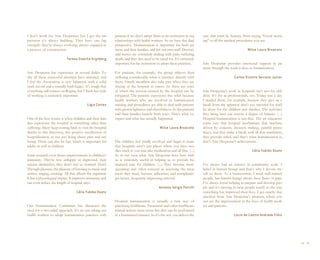
![Well, I’ll begin with what I left. I left an open door. That about what a favela is, what a community is. That’s the PARTNERING
was nice – I left the organization and the project contin- biggest lesson of all.
ued. That’s what demonstrated the project’s legitimacy. One of the first partners I found for the Einstein in the
It was the organization’s project, not mine. It was a good William Malfatti Paraisópolis Community Program was Arte Despertar.
project; in fact, it’s still running today. And what did Arte I believe children can develop through art, develop
Despertar leave me? It taught me a different attitude to their personalities more fully, if they have a chance to
the Rouanet Law [which offers tax breaks in exchange The work done by Arte Despertar is wonderful: hat’s express themselves, to show what they think and feel
for cultural investment by business]. My prior experience off to them! It’s really effective and well-planned. about life. It’s been a very positive relationship from
had involved using the law for major projects with scant They know where to go and what to do. The music the word go. I believe I’ve also developed by working
social impact. I confess I didn’t have much faith in Arte project in Paraisópolis is extremely impressive! with Arte Despertar.
Despertar when it started. I was wrong. We succeeded.
What I’m trying to say is that Arte Despertar taught me Maria Nadir Azevedo de Moraes Telma Sobolh
to see that the amount of money you have isn’t the key
to whether you support a project or not. The experience
showed me you can do a relevant project without loads Typically they’re a little timid. I don’t know if it’s a mis- My relationship with Arte Despertar was very inter-
of money. Another lesson I learned was about the im- take. It’s a very conservative style. It’s a characteristic, esting because I’d just joined a corporation that was
pact of a project of this kind on the community. I’d never with pros and cons. As far as the disposition to attract structuring its communication sector and strengthening
been into a favela [slum] before, when one day Regina people is concerned, you could say it’s a mistake. its brand nationwide. Just as we were putting our plans
invited me along. So I saw, for example, the incredible together, Arte Despertar came along with a proposal. It
outreach of the Einstein in the Paraisópolis Commu- Guilherme Vidigal Andrade Gonçalves included a project called “Weekends with Music” for
nity Program, how it has transformed the community. the Paraisópolis community. The idea was to use Roua-
The people who live in that area know they have a point net Law incentives. It would have a considerable social
of support for healthcare, education, schooling etc., and I think the first “round” as an institution was with a impact by giving children from the community some-
that it’s a program designed to assure cultural develop- pharmaceutical company, and the first slip-up was also thing to do on Saturdays. Arte Despertar proposed to
ment in a cyclical manner. You can see the impact it has with that company, when they changed their CEO and run activities there so as to inspire the children to de-
on the community. You can see the look of hope about sponsorships as well. So then we had to go out and get velop an interest in music. (...) The project was a huge
the future on people’s faces, the look of happiness, their another sponsor. surprise. (...) This was in 2000, and it’s still running
expectations that things can only get better. And they today. We succeeded in implementing the project in
demand that respect because they constitute a commu- Dario Ferreira Guarita Neto a well-organized form. It began with one group, then
nity. You see those people developing, improving their along came others, they performed music for the kids
organization, earning an honest livelihood. There’s a very and a lot of them liked it so much they became profes-
mistaken idea about what a favela is, or a community as It’s very important for people to know about this work, sionals and are now making a living as musicians.
we prefer to call it. The prejudice is that all the people about what’s happened in the past few years, about the
who live there are hopeless or feckless, dangerous even, numbers and so on, so that the Association can grow. William Malfatti
people without a job or a trade, drifters. That’s not it at We need to publicize what we’re doing as widely as pos-
all. When you go in, what you see is that people grasp sible. We need to multiply our knowledge, take it to new
all the opportunities they’re offered. Arte Despertar places we’ve never thought of going to. That could en- Arte Despertar was fundamental for our programming
awakened me to this. It enabled me to see the able us to expand our outreach via a multiplier model. in the Paraisópolis community. (...) However, when
community differently. That’s great, because I believe you consider Third Sector organizations in general, it’s
that kind of experience makes you think differently Heloisa Guarita Padilha important to realize that an NGO is not an organiza-](https://image.slidesharecdn.com/artedespertaringlesmiolobaixa-110608154654-phpapp01/85/Arte-Despertar-the-first-decade-52-320.jpg)
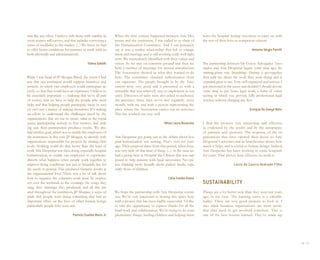
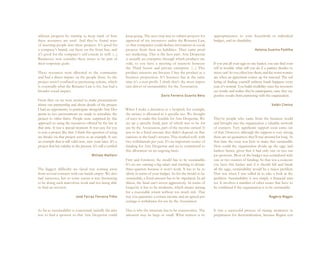
![tralized everything and without her it didn’t work. All Third Sector organizations face the major chal- because if you strengthen the cause you strengthen all
During the process it became clear that this was an lenge of sustainability, both financial and in terms of the NGOs that are working in that field.
obstacle to sustainability. So it was important for the well-structured projects that can be multiplied. Arte
evolution of Arte Despertar. Despertar, in my view, is aware of this challenge in Valdir Cimino
both respects and is working on both financial and
Guilherme Vidigal Andrade Gonçalves project sustainability. One of the main obstacles or
problems for many Third Sector organizations is Yes, I do have an idea of the importance of the legal work
that they’re too narrowly focused on welfare. Arte we do for Arte Despertar. I also believe in the impor-
This was a concern that I always expressed to Regina, Despertar doesn’t see itself like that. There’s no tance of this contribution to a better world. Any initiative
because of course business organizations aim to boost limit to the work it can do. It’s focusing on train- that’s well organized , with transparency, technical quality
their corporate image when they support activities such ing and preparing intermediaries who will work with and honesty, helps make the world a better place. We in
as these, which is legitimate. The secret is how you the final beneficiaries at the end of the chain. Most the professions have the capacity to contribute to efforts
make use of it. We’ve always been careful not to let the other NGOs work directly with the final beneficia- to improve the world and people’s lives. If we each im-
marketing overshadow the activity. Marketing is a con- ries and that creates a need for a very large amount prove what we do, the world will also improve.
sequence of the sheer dimensions of the project. We of human and financial resources, which it’s often
didn’t want the project to be used as a springboard for difficult to develop. Arte Despertar, in contrast, Enrique De Goeye Neto
publicity and marketing. The involvement was there, now has a much more interesting focus on interme-
and the project was an example to other companies. It diaries, many of them in hospitals, such as doctors,
had an impact on the community. Children went to the nurses and so on, helping them and training them My expectation is that it will indeed be a relevant
company’s offices via the project to have their work in the context of hospital humanization and en- institution in the context of Brazilian society, that it
recognized. We extended the project and produced a couraging them to work with colleagues so that the will once day extend its reach out from São Paulo to
CD. The children also recorded one in a studio. multiplier effect can happen. So I believe the model the rest of Brazil, and that it will continue transform-
pursued by Arte Despertar is very interesting and ing society with the ideals and methods we’ve seen
William Malfatti produces success without constantly requiring more in the past ten years. I don’t expect us ever to know
resources, whether human or financial, because this precisely the value of what we do, but we are able to
So you began to see companies that managed to balance will happen almost naturally. ascertain that this type of initiative promotes very
social, economic and environmental concerns, no longer important changes in the beneficiaries. So we expect
just to boost their image but because they simply had to Patrick Charles Morin Jr. this to become public policy within a few years.
in order to survive. The companies that emerge now are
in a new world where the customer’s demands prevail. Dario Ferreira Guarita Neto
This is a stage that requires consumers to change their I have the impression that this will be the watchword
habits. A very difficult subject. Companies that don’t for the next stage in the development of Arte Despertar.
have that balance will start losing competitiveness and I agree with what he said, but one of the challenges for
could even go out of business in some sectors. I believe José Ferraz Ferreira Filho the next ten years is to try to decentralize the leadership
the organizations that have led from the front in this exercised by Regina. I would set that goal. It’s extreme-
respect are the NGOs, which are now part of the debate ly important for the perpetuation of Arte Despertar,
that’s going on throughout society in a very important We’re partners in the Conference on Humanization in alongside making all its work replicable. As for when
way. They have a great deal of strength and influence. Healthcare [www.vivahumanizacao.org.br]. This is the or to what extent this can be done, I don’t know. (...)
main partnership. We exchange information and share
Dario Ferreira Guarita Neto production of the event. We’ve embraced this cause Guilherme Vidigal Andrade Gonçalves
52 I 53](https://image.slidesharecdn.com/artedespertaringlesmiolobaixa-110608154654-phpapp01/85/Arte-Despertar-the-first-decade-55-320.jpg)
